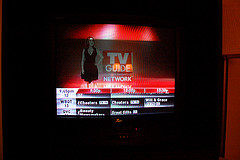
It’s been a while since we’ve updated our Downstreaming series. The concept of downstreaming was one of simplification, and how you can downgrade your paid cable
bill and look at internet based alternatives. Some people talk about cord cutting…but it is clear the alternatives aren’t quite there for everything.
The Wall Street Journal featured an article which was written as a tearful goodbye to the author’s cable service.
“Everyone’s getting their shows and movies through the Internet these days. I’m sorry. It’s just the reality of things… Yeah, I’ve changed, but you know what? You’ve changed more. I mean, come on. How many shows about housewives are there? I like chefs, but I don’t need to see them on television 24/7. Ghost hunters? Dancing celebrities? Talent shows? “Shark Week”? Celebrity ghost-hunting talent shows during “Shark Week”? It’s too much of too little. You’re full of a lot of inescapable crap.”
And we have to agree. Television is catering to someone, and it isn’t us. The Sci-Fi Channel is SyFy, and where’s the Science Fiction? The TV Guide channel no longer shows a tv guide. The Learning Channel….what the heck are we supposed to be learning on it now? There are so many channels, and how many of them do you actually want.
In a recent appearance on the MythTVCast, our editor was commenting on how hard it was to figure these things out. Too many channels, not enough package choices, and a resistance to changing with the time. And our own conception continues to involve. We continue to realize things about ourselves and our habits that we want to use to change what we do.
Related articles
- Your console is your cable box as Comcast, HBO Go, Verizon FIOS, and more come to the Xbox 360 (arstechnica.com)


I have “cut the cord” figuratively. I get my Internet through cable, and I don’t control the cable subscription where I live, so I can’t ACTUALLY cut the cable, but I haven’t watched a single program from start to end in my own home for about 4 years now. And I love it. After getting rid of television, I now am able to actually follow the plot in series, and I get to watch them when I want, where I want.
I’ve also found that friends have started asking me what series to watch since they are too “stuck” with television to cut the cord, but at the same time, they don’t actively (is it OK to say “actively” when talking about a pastime that sits you on your 6 o’clock for hours on end?) use it anymore either. It’s just background noise. When they want quality or something new, they ask me what they should look up.
I’ve also noticed that I no longer engage in mindless debates over whether this or that person belongs in a series, or which person is a bitch/bully. I now discuss the plot and questions raised by the series I’m watching. Still not a debate worthy a philosophical tribute, but I like to think that it’s a far better debate than whether or not airhead 1 or airhead 6 should have won Top Model, or how ugly airhead 2 was in that $4,000 dress.
I also search out news from several different sources now, as opposed to when I was watching broadcast television. I like to think that this gives me a more balanced view. It’s also given me more insight into privacy and security concerns online (what isn’t online these days anyway?) and my friends have been shocked whenever I’ve told them what the implications are for them. Not that they necessarily take my advise to heart, but I take comfort in knowing that they at least know how our government, foreign governments, multi-national companies want to keep a permanent record of everything they say, do, watch, think for possible future litigation and criminal investigation, neglecting the principle of “Assumed innocent until proven guilty”
I have discovered more music, better music, than when I was only fed the same 100+ songs every time I flipped through the channels.
For me, there have been no disadvantages to cutting the cord, only advantages.
I cut the cord in 2009. Loving it. My checkbook loves it too.